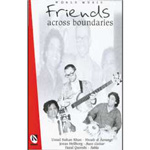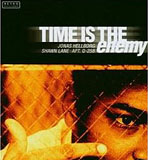Home » Jazz Articles » Jonas Hellborg
Jazz Articles about Jonas Hellborg
Jonas Hellborg: The Concert of Europe

by John Eyles
Swedish bass guitarist Jonas Hellborg has the knack of being in the right place at the right time when it comes to meeting reputed musicians; in 1981, after he played solo bass at the Montreux Jazz festival in Switzerland, he was introduced to guitarist John McLaughlin and other fusion stars. He was soon asked to join a reformed Mahavishnu Orchestra in 1983. He stayed with McLaughlin until 1988, touring and recording with Mahavishnu Orchestra, and playing several duet tours with ...
read moreJonas Hellborg / Fazal Qureshi / Ustad Sultan Khan: Friends Across Boundaries

by Bhasker Gupta
The delight of writing a review of this album derives from the fact that I've been listening to it for roughly an year now and finally succeeded in getting it autographed from Jonas Hellborg on his recent visit to India. This album is a distinctive, spontaneous collaboration between Swedish jazz bassist Jonas Hellborg, the famous sarangi maestro Ustad Sultan Khan, and Indian percussionist Fazal Qureshi. When asked about the inspiration behind the album, Jonas amusingly answered that they had a ...
read moreJonas Hellborg/Shawn Lane/Jeff Sipe: Time is the Enemy

by C. Michael Bailey
Time is the Enemy was assembled during a particularly productive period for the trio of Jonas Hellborg, Shawn Lane, and Jeff Sipe. It was recorded live at various unidentified locations around the world during 1996. Other recordings surrounding this original 1997 release, now remastered, include the live Temporal Analogs of Paradise , also recently remastered. As a set, these two recordings document the brilliant improvisatory empathy held by these three fusion experts. Sadly, the remastering and release of Time is ...
read moreHellborg/Lane/Sipe (Apt. Q258): Temporal Analogues of Paradise

by Todd S. Jenkins
Temporal Analogues of Paradise was originally issued in 1996, it stood the fusion world on its ear. The uncanny melodicism of the three performers--Jeff Sipe being the most surprising--set a new standard for electric improvisation. Jonas Hellborg has now remastered the disc and reissued it on his own label, brightening up the sound for an even more awe-inspiring experience.
Like many of Miles Davis' controversial albums in the 1970s, this disc was assembled from a large number of clips. The ...
read moreJonas Hellborg, Shawn Lane, Jeff Sipe: Temporal Analogues of Paradise

by C. Michael Bailey
One could conceivably reason that Jonas Hellborg's Temporal Analogues of Paradise was merely a retro exercise in mid-'70s flabby musical excess, as the live release, recorded in Europe in 1995, includes only two, 25-minute plus pieces. Having listened to hours of such music, I would characterize this disc a bit differently. These two long pieces come closest, in an electric way, of approximating Keith Jarrett's Köln Concert.
Each, in rather similar ways, allows improvisation to unfold patiently and carefully, never ...
read moreHellborg, Lane, Umamahesh, Selvaganesh, Umashankar: Icon

by C. Michael Bailey
Last year's Personae was a fusion powerhouse, laying creative waste to all in its way. Not content to rest on his muse, über -bassist Jonas Hellborg has set out after the polyphonic and polyrhythmic music of India. Hellborg and long term collaborator Shawn Lane apply their synthetic method, meshing East and West with Indian vocalist V. Umamahesh and two percussionists, V. Selvaganesh and V. Umashankar--who play the ghatam and the kanjeera, two types of hand drums used in the Southern ...
read moreHellborg/Lane/Selvaganesh/Umashankar/Umamahesh: Icon

by Jim Santella
Music: the universal language.
As civilizations developed around the world, music evolved alongside regional and cultural differences. The most basic of elements have always been there in common, but differences exist and continue to keep cultures apart. The human voice takes on various colors, even without language. Tuning may give one program preferences over another, depending on the listener’s ear. Then, there’s the instrumentation to deal with. The kanjeera, konokol and ghatam may be unfamiliar to many of ...
read more


















